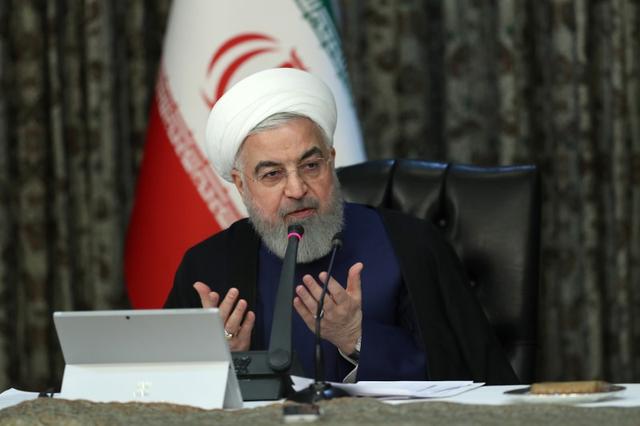Iran’s economic outlook is grim
https://arab.news/vgymx

America last week announced that two aircraft carrier strike groups had been deployed in the Arabian Sea “to ensure freedom of navigation and the free flow of commerce,” while providing the commander with “significant striking power” when required. This is a major increase in US firepower directed at Iran.
This military movement in the Indian Ocean echoed the “tense debate” in the White House on the day the announcement was made. The New York Times reported that, in response to rocket attacks in Baghdad that killed two US soldiers, Secretary of State Mike Pompeo and National Security Adviser Robert O’Brien strongly urged President Donald Trump to initiate tough military action on Iran. Their contention was that the country, already ravaged by the coronavirus, would then be more amenable to negotiations with the US.
This escalation was avoided because the defense secretary and the chairman of the Joint Chiefs of Staff resisted it. They argued that there was no evidence of a direct Iranian role in the Iraq attacks, that the US response could lead to a larger conflict, and that such a confrontation would further damage America’s ties with Iraq.
Against this backdrop, Iranian President Hassan Rouhani on Friday — at the commencement of Nowruz, the Iranian New Year — directly addressed the American people. He noted that the coronavirus pandemic made no distinction as to “nationality or gender or religious background.” In this long fight, he said, “we all belong to one front.” Despite this, he noted that the US government had imposed “more than 100 collective punishment measures against the Iranian people.” He urged his audience to “speak loudly” to correct this “dark chapter in American history.” Later, Rouhani referred to the US’ offer of humanitarian assistance as “the biggest lie in history.”
With more than 27,000 people confirmed infected by the virus and 2,000 dead, Iran is among the worst-affected countries globally. From the city of Qom, the virus has traveled across the country. It has infected several prominent personalities, including two vice presidents, senior adviser to the supreme leader Ali Akbar Velayati, several members of the Majlis, the head of the national emergency services, and the deputy health minister.
Observers believe that the government was slow in publicizing the virus attack in its early stages and did not take adequate precautionary measures. This might have aggravated the spread and the death toll. From mid-February, however, the country has been tackling the scourge on a war footing, with lockdowns of holy shrines, restrictions on movement, and the nationwide mobilization of emergency medical services. Iran’s neighbors have put restrictions on the cross-border movement of goods and people, while the UAE has provided urgently required medical supplies.
The pandemic has aggravated the damage to the Iranian economy caused by US sanctions. Following the imposition of the sanctions, Iran’s oil exports have plunged to below $10 billion per year, reducing its annual budget by about 40 percent. Its middle class has shrunk from 60 percent of the population in the 2000s to below 50 percent today. The sanctions have also reduced Iranians’ average purchasing power by about 20 percent since 2018.
The government has blamed US sanctions for its limited medical supplies. Foreign Minister Mohammed Javad Zarif has asked the UN secretary-general to end the sanctions, which are “obstacles to the sale of medicines, medical supplies and humanitarian goods.”
Iranian commentator Bijan Khajehpour has said that the pandemic could cause a contraction of Iran’s gross domestic product by about 3 percent. Hence, Iran, for the first time since its revolution of 1979, has asked the International Monetary Fund for an emergency loan.
The pandemic has aggravated the damage to the Iranian economy caused by US sanctions.
Talmiz Ahmad
The most vulnerable are obviously the very poor. The president’s former economic adviser, Masoud Nili, has said that the poor “would be unable to protect themselves against the coronavirus… they would be the epicenter of contracting and spreading the disease.” Heeding this advice, Rouhani prioritized cash transfers to those “without a known source of income,” which is about 20 percent of the population.
In the face of challenges from sanctions, Iran has displayed both resilience and innovation. Its initiatives have included: Greater domestic production, increased non-oil exports (such as petrochemicals, cement and steel), and the boosting of regional markets, including Iraq, Turkey and Afghanistan. However, with the US policy approach to Iran being limited to initiating fresh sanctions in the hope of pressurizing Tehran to return to negotiations, the outlook for Iran remains grim. Its economy is likely to remain under severe pressure, while the regional tit-for-tat skirmishes could at some point escalate into a wider conflict that no one wants.
What the Middle East desperately needs is a shift from “maximum pressure” to “maximum understanding and accommodation” in order to realize a comprehensive regional peace agreement. That would be the best outcome of the coronavirus pandemic.
- Talmiz Ahmad is an author and former Indian ambassador to Saudi Arabia, Oman and the UAE. He holds the Ram Sathe Chair for International Studies at the Symbiosis International University, in Pune, India.










































